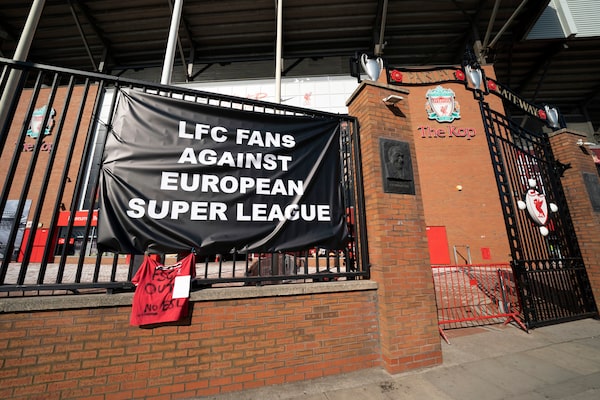
A banner is seen outside Liverpool's Anfield Stadium protesting the formation of the European Super League on April 19, 2021.Jon Super/The Associated Press
A bid by some of the biggest soccer teams in Europe to form a super league is facing a fierce backlash from fans, governing bodies, presidents and prime ministers, who have vowed to block the proposal.
“We are going to look at everything that we can do with the football authorities to make sure that this doesn’t go ahead in the way that it’s currently being proposed,” British Prime Minister Boris Johnson said Monday. “I don’t think that it’s good news for fans; I don’t think it’s good news for football in this country.”
On Sunday, a dozen teams from the top flights in England, Spain and Italy announced plans to form a European Super League, which would begin play as early as August. The clubs – which include Manchester City, Manchester United, Liverpool, Barcelona, Real Madrid and Juventus – said they expected three more teams to join the venture. They’ve also secured around US$6-billion (C$7.5-billion) in financing from American investment bank JPMorgan Chase.
The controversial Super League plan takes the North American model of sports ownership to Europe
The league’s structure has all the hallmarks of the franchise system that’s common in North America but alien to Europe. In European soccer leagues, the bottom teams face relegation and clubs have to qualify for Europe-wide competitions such as the Champions League. The Super League would be a largely closed shop run by the 15 founding clubs. They would be permanent members and add another five teams annually through a qualification mechanism.
The league’s founders hope to create a kind of National Football League for soccer with star teams, the best players and lucrative television contracts. But the proposal has been widely condemned as a money grab and a threat to the traditions of European soccer.
“This idea is a spit in the face of all football lovers and our society as well,” said Aleksander Ceferin, president of the Union of European Football Associations, which is made up of 55 national associations and runs the Champions League. “It’s about greediness and selfishness and the narcissism of some. Nothing else.”
Ceferin told a news conference on Monday that UEFA would move to expel the teams from all European competitions, including this summer’s Euro 2020 championship. It’s also working with the global governing body, FIFA, to ban players who compete in the Super League from participating in the World Cup. “They will not be able to represent their national team at any matches,” he said.
Manchester City, Chelsea and Real Madrid have advanced to this year’s Champions League semi-finals, but Ceferin indicated that they could be forced to drop out. Manchester United and Arsenal may also have to abandon their coming semi-final games in the Europa League, which is also run by UEFA.
Others joining in a chorus of outrage on Monday included Italy’s Prime Minister Mario Draghi, French President Emmanuel Macron and the European Union. The British government promised to “put everything on the table” to stop the league.
Fans, too, heaped scorn on the owners of the 12 teams, many of whom are from the United States or the Middle East. “This represents the death of everything that football should be about,” said the Arsenal Supporters’ Trust. A group of Liverpool fans put up a banner outside the club’s Anfield stadium that read: “Shame on you. R.I.P. LFC 1892-2021.”
Representatives from the dozen teams kept a low profile on Monday, but they have long been frustrated by the Champions League format. They believe the Super League will be a better competition and generate more revenue to cover “solidarity” payments to other clubs. “These solidarity payments will be substantially higher than those generated by the current European competition and are expected to be in excess of €10-billion (C$15-billion) during the course of the initial commitment period of the clubs,” the teams said in a statement.
They also pledged to remain in their domestic leagues and compete in the Super League tournament during the season instead of the Champions League.
The 12 teams said they’d been motivated in part by financial problems caused by the COVID-19 pandemic. “The pandemic has shown that a strategic vision and a sustainable commercial approach are required to enhance value and support for the benefit of the entire European football pyramid,” they said.
There’s little doubt that the pandemic has crippled most clubs and pushed some to the brink of insolvency. Barcelona and Real Madrid each lost more than €90-million last season because of COVID-19, while Manchester United reported a £23-million shortfall. Barcelona’s debt has soared above €1-billion, and it recently had to renegotiate some of its debt to avoid filing for bankruptcy protection. Atletico Madrid’s debt has also reportedly climbed to a record €1-billion.
The clubs had been in talks for months with UEFA about reworking the Champions League. On Monday, Ceferin announced a series of changes, including expanding the competition to 36 teams from 32.
He chastised representatives from the breakaway teams for publicly supporting the proposed changes while secretly working on the Super League. Calling them “snakes” and “liars,” Ceferin added: ‘I was a criminal lawyer for 24 years, so I’ve seen different people. But I’ve never, ever, seen people like that. … Obviously greediness is so strong that all the human values evaporate.”
Not all the big clubs in Europe have agreed to join the Super League. None of the teams in Germany or France – including Bayern Munich and Paris Saint-Germain – has signed on. “We must not allow the financial interests of a few top clubs from England, Italy and Spain to result in the abolition of tried and tested structures,” a statement from the German Football Association said.
 Paul Waldie
Paul Waldie